
Journal of Geriatric Cardiology
Scope & Guideline
Advancing cardiovascular health for the aging population.
Introduction
Aims and Scopes
- Geriatric Cardiology Research:
The journal emphasizes studies that explore cardiovascular diseases specifically affecting older adults, considering their unique physiological, psychological, and social factors. - Innovative Treatment Modalities:
Research on new and existing treatment strategies tailored for the geriatric population, including pharmacological interventions, surgical options, and novel technologies. - Epidemiological Studies:
The journal publishes findings from epidemiological studies that assess the prevalence, risk factors, and outcomes of cardiovascular diseases in older populations. - Health Outcomes and Quality of Life:
Focus on the impact of cardiovascular conditions on the overall health status, functional ability, and quality of life of elderly patients. - Multimorbidity and Cardiovascular Interactions:
Exploration of the interplay between cardiovascular diseases and other comorbidities common in the elderly, such as diabetes, hypertension, and cognitive decline. - Guidelines and Consensus Statements:
Development and dissemination of clinical guidelines and expert consensus on the management of cardiovascular diseases in older adults.
Trending and Emerging
- Telemedicine and Remote Monitoring:
The rise of telemedicine and digital health technologies is gaining traction, particularly in managing chronic cardiovascular diseases among elderly patients, allowing for better monitoring and access to care. - Frailty and Comprehensive Geriatric Assessment:
Increasing attention is being given to frailty as a significant predictor of outcomes in cardiovascular patients, leading to the incorporation of comprehensive geriatric assessments in clinical practice. - Integration of Artificial Intelligence:
Emerging research explores the use of artificial intelligence in diagnosing, predicting outcomes, and personalizing treatment plans for elderly patients with cardiovascular diseases. - Patient-Centered Care Approaches:
There is a growing trend towards understanding and implementing patient-centered care models that take into account the preferences, values, and needs of elderly patients. - Multimorbidity Management:
Research focusing on the management of multiple chronic conditions in elderly patients is increasingly relevant, emphasizing the need for integrated care strategies. - Impact of Lifestyle Interventions:
Studies investigating the effects of lifestyle modifications, such as diet and exercise, on cardiovascular health in older adults are on the rise, highlighting preventive measures.
Declining or Waning
- Basic Science Research:
There appears to be a waning emphasis on basic science research in cardiology, as the focus shifts towards clinical applications and outcomes in geriatric patients. - Single Disease Focus:
Publications that concentrate solely on specific cardiovascular diseases, rather than considering multimorbidity and comprehensive care approaches, are becoming less prominent. - Traditional Risk Factor Analysis:
Research that solely focuses on traditional cardiovascular risk factors without integrating newer perspectives, such as psychosocial factors and lifestyle interventions, is declining. - Acute Interventions in Younger Cohorts:
The journal has shifted away from studies emphasizing acute interventions in younger populations, concentrating instead on the elderly demographic. - Invasive Procedures without Geriatric Considerations:
There is a noticeable decrease in studies that do not account for the specific risks and outcomes of invasive procedures in older patients.
Similar Journals

TRENDS IN CARDIOVASCULAR MEDICINE
Transforming Research into Clinical ExcellenceTRENDS IN CARDIOVASCULAR MEDICINE, published by Elsevier Science London, stands at the forefront of the cardiology field, with a commendable Q1 ranking in the category of Cardiology and Cardiovascular Medicine. Since its inception in 1991, this esteemed journal has provided a vital platform for disseminating cutting-edge research and innovative clinical practices, reflecting the dynamic developments in cardiovascular health. With an impact factor positioning it among the top 3% in its category, TRENDS IN CARDIOVASCULAR MEDICINE is essential reading for researchers, healthcare professionals, and students pursuing the latest advancements and evidence-based approaches in cardiology. Although this journal does not currently operate under an open-access model, its rich array of content encompasses a variety of topics from clinical studies to reviews, ensuring readers stay informed on the pivotal trends that shape cardiovascular medicine. This commitment to excellence underscores the journal's role as a premier resource for anyone dedicated to improving cardiovascular health.
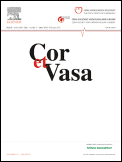
COR ET VASA
Bridging the gap between research and clinical practice in cardiology.COR ET VASA is a prominent peer-reviewed journal in the field of cardiology and cardiovascular medicine, published by the Czech Society of Cardiology and Czech Society of Cardiovascular Surgery. Established in 1961, and continuing its legacy from 2006 to 2024, this journal serves as an essential platform for disseminating significant research findings, clinical studies, and innovative treatments in cardiovascular health. While currently positioned in the Q4 quartile, the journal aims to enhance its impact by fostering knowledge sharing among researchers, clinicians, and students alike. The journal, with its publication in Czech Republic, provides a unique perspective to the European cardiovascular community, allowing for invaluable insights and discourse. Researchers are encouraged to submit their manuscripts and contribute to the growing body of knowledge in this critical area, although it should be noted that COR ET VASA does not offer open access options at this time. As the field of cardiovascular medicine evolves, COR ET VASA remains committed to addressing the latest challenges and advancements, nurturing a rich dialogue within the community.
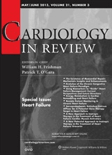
Cardiology in Review
Empowering professionals with essential cardiology insights.Cardiology in Review, published by Lippincott Williams & Wilkins, is a prominent journal focused on advancing the field of cardiology and cardiovascular medicine. With a history of publication spanning from 1995 to 2024, the journal serves as an essential resource for researchers, healthcare professionals, and students alike, offering in-depth reviews and analyses on the latest developments, clinical practices, and research findings in cardiology. Despite being a traditional print journal, it maintains a commendable Q2 ranking in both cardiology and miscellaneous medicine categories as of 2023, reflecting its influence and rigor in the academic community, with a Scopus rank of #132 out of 387 in its field, placing it in the 66th percentile. The journal aims to bridge the gap between clinical practice and emerging research, promoting a deeper understanding and integration of innovative strategies in cardiovascular care. With its commitment to high-quality scholarship, Cardiology in Review remains a vital conduit for knowledge and dialogue within the evolving landscape of cardiovascular health.
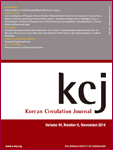
Korean Circulation Journal
Pioneering Insights in Cardiology and Cardiovascular Medicine.Korean Circulation Journal, published by the Korean Society of Cardiology, has established itself as a prominent platform for disseminating research in the fields of Cardiology and Cardiovascular Medicine. With an ISSN of 1738-5520 and an E-ISSN of 1738-5555, this journal has been at the forefront of cardiovascular science since its inception in 2006 and is projected to continue until 2024. The journal's commitment to quality is reflected in its 2023 category quartiles, ranking in the second quartile (Q2) for both Cardiology and Internal Medicine, as well as its commendable Scopus rankings within the respective fields. Located in South Korea, the journal aims to bridge the gap between cutting-edge research and practical applications, serving as an invaluable resource for researchers, healthcare professionals, and students keen on advancing their understanding of cardiovascular health. Although currently not an open-access journal, it provides a wealth of knowledge that encourages evidence-based practice in clinical settings.
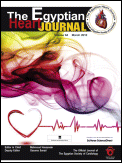
Egyptian Heart Journal
Connecting practitioners and researchers in the heart of science.The Egyptian Heart Journal, published by Springer, is a premier open-access journal dedicated to advancing the field of cardiology and cardiovascular medicine. As of 2023, it holds a Q3 classification within the category, showcasing its growing influence within the research community, and ranks 241 out of 387 in Scopus, reflecting a 37th percentile position. With an E-ISSN of 2090-911X, this journal has been open access since 2011, making it easily accessible to researchers, practitioners, and students alike. The journal aims to disseminate high-quality research articles, reviews, and case studies that contribute to the understanding and treatment of cardiovascular diseases. With its focus on innovative and practical solutions in cardiology, the Egyptian Heart Journal plays a critical role in shaping current and future cardiovascular research. Its global outreach and commitment to open access ensure that vital information is available to a wide audience, enhancing both scholarly discourse and clinical practice in the evolving landscape of cardiovascular medicine.

Revista de la Federacion Argentina de Cardiologia
Shaping the future of cardiovascular medicine with every publication.Revista de la Federacion Argentina de Cardiologia is a vital publication in the field of Cardiology and Cardiovascular Medicine, providing a platform for researchers and healthcare professionals to share significant findings and innovative concepts since its inception in 2012. Published by the Federacion Argentina Cardiology, this journal specifically addresses contemporary issues and advancements within cardiology, contributing to the scholarly dialogue essential for improving cardiovascular health. Despite being categorized in the Q4 quartile for 2023 and presently ranking #358 out of 387 in its field, the journal remains committed to fostering academic inquiry and disseminating valuable research for both local and global audiences. Although it is not an open-access journal, it strives to balance accessibility with rigorous academic standards, ensuring quality contributions that are critical for practitioners and students alike. The journal’s ongoing evaluation and adaptation in the ever-evolving landscape of cardiology underscore its importance in advancing cardiovascular science and practice.
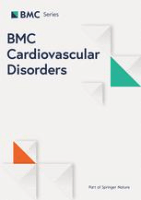
BMC Cardiovascular Disorders
Connecting researchers to transform cardiovascular health.BMC Cardiovascular Disorders is a premier open access journal dedicated to the field of cardiology and cardiovascular medicine, published by BMC, a leading publisher in the scientific community. Since its inception in 2001, this journal has provided a platform for high-quality research, showcasing innovative studies and critical reviews that contribute to the understanding and management of cardiovascular diseases. With an impressive impact factor and a rank in the Q2 category for 2023 within its field, BMC Cardiovascular Disorders stands at the forefront of cardiovascular research, enabling accessibility to a wealth of information that fosters collaboration and advancements in patient care. The journal's commitment to open access ensures that research is widely disseminated and easily accessible to researchers, practitioners, and students globally, enhancing the dialogue around cardiovascular health and disease prevention. Located in the United Kingdom, BMC Cardiovascular Disorders consistently aims to promote excellence in the study and treatment of cardiovascular conditions, encouraging the exchange of knowledge that ultimately benefits public health.
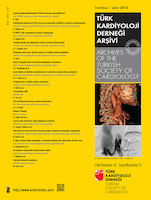
Turk Kardiyoloji Dernegi Arsivi-Archives of the Turkish Society of Cardiology
Sharing vital insights to elevate heart health worldwide.Turk Kardiyoloji Dernegi Arsivi-Archives of the Turkish Society of Cardiology is a prominent peer-reviewed journal dedicated to advancing the field of cardiology and cardiovascular medicine. Published by KARE PUBL, this journal has established itself as a key resource for researchers, healthcare professionals, and students since its inception in 1990. As an Open Access journal since 2017, it ensures that cutting-edge research and clinical findings are readily accessible to a global audience, thus fostering collaboration and knowledge sharing among the cardiology community. With its recent rank in the Q3 quartile for Cardiology and Cardiovascular Medicine in 2023, and a Scopus rank of #282 out of 387, the journal is positioned to enhance its influence in the cardiovascular field, offering valuable insights and promoting evidence-based practices. The journal covers a wide range of topics within cardiology and cardiovascular research, making it an essential platform for scholars aiming to contribute to the ongoing dialogue in this vital area of medicine. For those eager to stay updated with the latest research trends and clinical practices in cardiology, Turk Kardiyoloji Dernegi Arsivi represents a crucial resource.
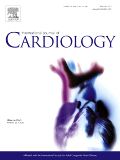
International Journal of Cardiology
Pioneering Discoveries in Cardiovascular MedicineThe International Journal of Cardiology is a premier publication in the field of Cardiology and Cardiovascular Medicine, published by Elsevier Ireland Ltd. With an impressive impact factor and ranked in the top quartile (Q1) of its category, this journal serves as a vital resource for researchers, clinicians, and scholars committed to advancing cardiovascular health. Founded in 1981, the journal has been pivotal in disseminating significant findings, with a wide-ranging scope that includes original research, reviews, and clinical studies aimed at improving patient outcomes and understanding heart diseases. Its robust ranking of #73 out of 387 in Scopus ensures that it remains a leading platform for impactful cardiovascular research. While currently not an open-access publication, the journal's commitment to quality and relevance makes it an essential reference point within an ever-evolving medical landscape. For those engaged in cardiovascular research, the International Journal of Cardiology is not just a journal; it's an indispensable source of knowledge shaping the future of heart health.
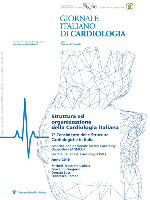
Giornale Italiano di Cardiologia
Uniting Experts to Transform Heart HealthGiornale Italiano di Cardiologia is a premier journal in the field of cardiology, published by PENSIERO SCIENTIFICO EDITORE. Established in 1996, this journal serves as an essential platform for sharing the latest research and clinical advancements in cardiovascular medicine, particularly catering to the Italian and international medical communities. Although currently classified in the Q4 quartile for Cardiology and Cardiovascular Medicine (2023), the journal strives to enhance its impact and outreach by embracing rigorous peer-review practices and promoting high-quality submissions. With a commitment to enriching knowledge and fostering dialogue among researchers, clinicians, and students, the journal offers a collection of articles that include original research, reviews, and case studies. While currently not an Open Access publication, readers will benefit from a wealth of research insights that contribute to advancements in cardiac care and treatment strategies. As the Giornale Italiano di Cardiologia continues to evolve, it plays a vital role in bridging research and clinical practice in the cardiovascular domain.